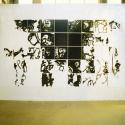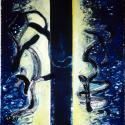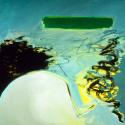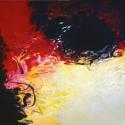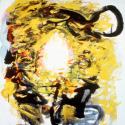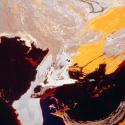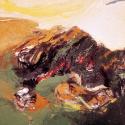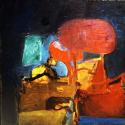Bing, Bernice
Other Names: 李玉冰; Bernice Lee
"Once upon a TIME it was rare to find any Asians in prestigious art schools. When I was an art student, I came to the realization that a brush felt more comfortable and familiar in my hand than a pencil. Dexterity with a brush leads me to the fine arts--painting.
At that time, I knew almost nothing about Eastern art or thought. I was totally naive about my own cultural heritage. I was living in and reacting to parallel worlds--one, the rational, conscious world of the West; the other, the intuitive, unconscious world of the East. This duality caused me to explore the differences and sameness in art forms.
Existentialism was the first influence that persuaded me toward the abstract expressionist school of painting. The philosophical bases of existentialism--one's responsibility for making one's own nature as well as personal freedom, independent decision-making, and the importance of commitment--were to me the attitude of the abstract way of painting.
The avant-garde of the late 1950s were inspiring–among abstractionist, de Kooning, Kline, Motherwell, Still; in jazz, Coltrane, Ornette Coleman, Monk, Mingus; in poetry, Stein, Pound, Genet, Rilke; in literature, Camus, Gide, Hesse, Mann, de Beauvoir; in the theater, Beckett, Genet, Albee, and in the art films, Bergman, Antonioni, Fellini. These were my mentors, muses, and totems.
Zen Buddhism, through Suzuki's books, spread rapidly to the West Coast. Sabura Hasegawa, a Zen painter, was my first profound influence in Eastern thought. 'To see without seeing' was a concept totally foreign to me. There began my pursuit of more knowledge of the poetry and thought of Po Chu-I, Chung Tzu, Lao Tzu, Shakyamuni, and Wang Hsi-chih, the 'calligrapher sage'.
Fritjor Capra has written in his Tao of Physics, 'Modern physics goes far beyond technology; the way--or Tao of physics can be a path with a heart, a way to spiritual knowledge and self-realization.' Recently, since my return from a trip to China, I have made a path to my heart with Chinese calligraphy. Chinese calligraphy has been evolving for six thousand years, whereas in our Western society we are but primitives experiencing a new esthesis. In my abstract imagery, I am attempting to create a new synthesis with a very old world.
For me, all nature is pure, and purely abstracted, and the spiritual union links both the seen and the unseen forms of nature. Freedom, for example, is seeing trees as pure energy, light, and mass made up of liner particles.
I would like to think of myself as a disciple of the art of Chinese calligraphy; however, my practice and knowledge are those of a novice. Yet, the outcome of my personal statement--how I view the world, using only the knowledge and experiences from the past, present, and the future--remains on its own terms."
Bernice Bing, Artist Statement
Gallery of Selected Works
Selected Documents
- Article "Bernice Bing" by James Monte in Artforum, July 1963
- Article "Quantum Bingo" by Lydia Matthews from exhibition catalog Bernice Bing, Memorial Tribute and Retrospective, SomArts, 1999
- Artist Resume, [1994]
- Artist Statement(s)
- Artist's Statement on the Quantum for the Triton Museum Exhibition, 1992
- Interview from artist catalog, Bernice Bing, 1991
- Introduction by Valerie Soe to artist catalog, Bernice Bing, 1991
- Review (Title Unknown) by Thomas Albright in San Francisco Chronicle, July 12, 1968
- Exhibition flyer for "Milieu: Part 1", Asian American Arts Centre, 1993
- Exhibition press release for "Milieu: Part 1", Asian American Arts Centre, 1993
Other Links
- Bernice Bing at Women Artists of the American West
- Bing Narrative Chronology at Queer Cultural Center
- WorldCat Identities Bibliography
- Wikipedia Entry
View artist folder list at Asian American Arts Centre

